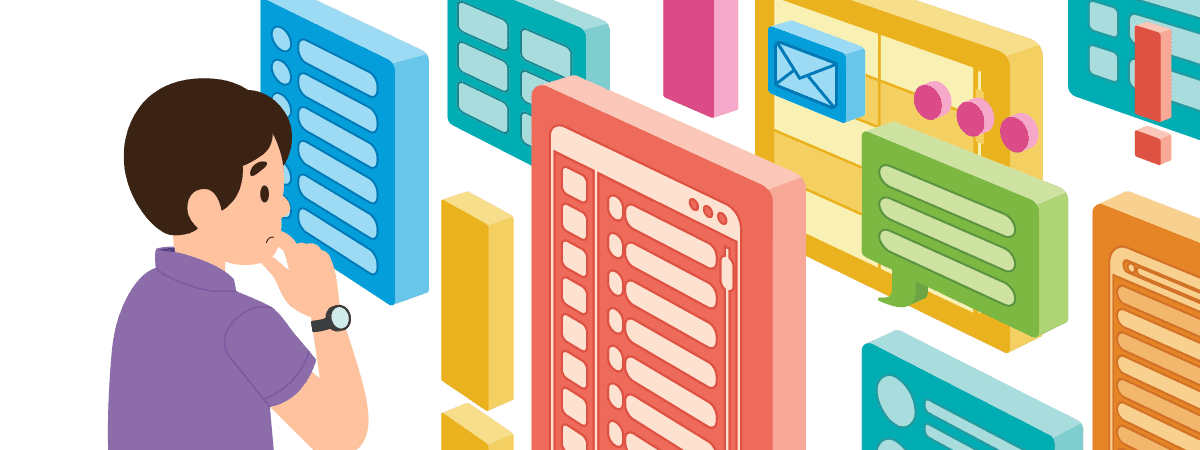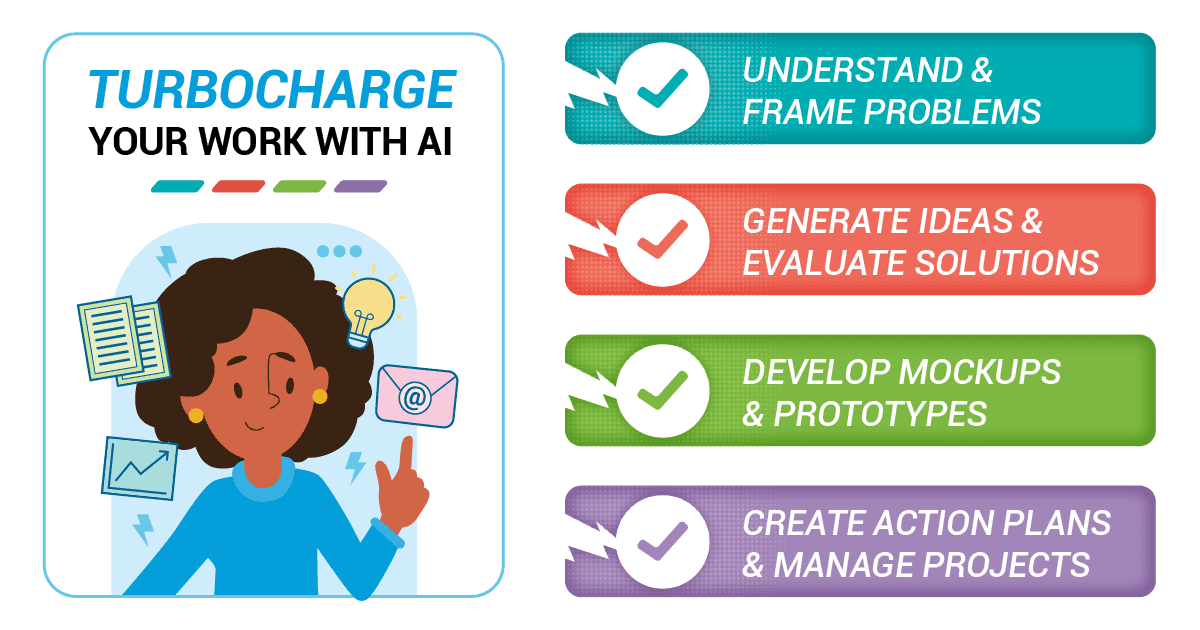
Let’s start with a question. Have you ever found yourself staring at a full email inbox, wishing for an assistant to sift through your emails and prioritize them? Or dreamt of a magic tool that could take a vague idea and refine it into a solid plan? Welcome to the world where these dreams come true. Welcome to the world of Artificial Intelligence or AI.
We often associate AI with high-tech robots or advanced computers doing complex tasks. But today, I want you to imagine AI as a friendly assistant who’s here to make your day-to-day life easier and more productive.
We all face problems that need solving, generate ideas, and create plans, whether it’s in our personal lives or our professional careers. And AI has immense potential to transform how we do these things. By the end of this article, my goal is to make you realize that AI is about us, human beings, improving the way we live and work.

AI can help you understand and frame problems you want to solve
AI can work like a powerful magnifying glass, allowing you to see into the core of complex issues. AI-powered data analytics tools can help you sift through vast amounts of information, revealing hidden trends and patterns that you might not see otherwise.
Picture this: You’re an entrepreneur with a brilliant product idea. But the question remains, who is your target market? Typically, you’d spend weeks or even months analyzing data, conducting surveys, or meeting with focus groups. Now, imagine discussing this with an AI model, feeding it your data, and it suggesting, ‘Have you considered tailoring your product to serve this specific demographic?’ Just like that, your problem is reframed, the path is clearer.
Consider a more complex scenario: You’re a policy maker facing the multifaceted challenge of affordable housing. A problem like this is like a knot, tightly wound with threads of supply and demand, zoning laws, socio-economic factors, and so much more. Working with an AI model like ChatGPT, you can untangle these threads, dissect the issue into manageable components, and gain a comprehensive understanding of each part. This leads to more informed decision making and, ultimately, more effective solutions.
Here are a few areas to consider when thinking about how AI can help you understand and frame problems:
- AI Role-Playing: An AI assistant such as ChatGPT can serve as an interactive problem-solving tool. Let’s say you’re a product manager trying to figure out the best features to add to your software. You could ‘role-play’ with the AI, where you play the role of the end-user and the AI plays the role of the product. The dialogue could help reveal potential challenges or needs the user might have, or give you insights on how to refine your product’s user interface or features. Similarly, the AI could take on the role of various stakeholders or customer personas, allowing you to understand different perspectives on the same issue.
- Case Study Research: Large language model AI like ChatGPT can summarize and analyze large amounts of text data, including case studies. For instance, if you are a healthcare professional trying to understand the impacts of a particular treatment approach, the AI could help you sift through numerous medical case studies and provide summaries, comparisons, and even potential patterns or trends. This way, you can focus on making informed decisions rather than getting bogged down by the data gathering and preliminary analysis stages.
- User Analysis: AI can be a potent tool in analyzing user data, behaviors, and patterns. For example, an AI can analyze customer reviews of your product or service, detecting patterns, and identifying common issues that customers are facing. By highlighting these problems, AI can assist you in prioritizing which issues to tackle first. It can also help segment your user base to better understand and address the needs of different types of users.
AI can help you generate ideas and evaluate possible solutions
AI doesn’t sleep, and it doesn’t run out of ideas. AI tools like generative models can suggest thousands of potential solutions to a problem, while decision-making algorithms can rank these solutions based on predefined criteria. Imagine you’re a marketer trying to come up with a catchy slogan for a new product. You could feed an AI language model like GPT-4 with relevant data and let it generate hundreds of unique slogans. Then you could use another AI tool to evaluate each slogan’s potential effectiveness, saving you time and brainpower.
Imagine you want to cook a new dish but don’t know what. AI-powered cooking apps can generate ideas based on your dietary preferences, available ingredients, and even suggest the level of cooking complexity. Once you have several options, the app could evaluate and rank them based on user ratings and comments, ensuring you pick a dish that’s likely to turn out well.
AI can help you develop mockups and prototypes
Turning an idea into something tangible can be challenging, but AI can make this process smoother and faster. AI-powered design tools can create mockups based on your descriptions, allowing you to visualize your ideas better. As a product designer, you could use an AI tool to create a virtual prototype of a new product, tweaking the design until it’s just right. AI can then analyze quantitative and qualitative feedback to provide automated and/or guided adjustments to the design. Additionally, the AI could use feedback to generate new prototypes, and the process of gathering feedback and refining the design can be repeated until you’re satisfied with the result.
Suppose you’re planning to redecorate your living room. AI-powered interior design apps can create 3D mockups of your room. You can experiment with different furniture, color schemes, and layouts until you have a prototype design that you love.
AI can help you create action plans and manage projects
Planning and managing projects involves juggling multiple tasks, deadlines, and resources. AI can take much of the stress out of this process. Several tasks that AI can assist with include, but are not limited to: task allocation and scheduling, progress monitoring, predictive analytics, real-time adjustments, automated reporting, and goal re-evaluation.
AI project management tools can create efficient schedules, allocate resources wisely, and predict potential bottlenecks before they occur. So, if you’re leading a complex software development project, AI could help you plan tasks, assign them to team members based on their skills and availability, and keep the project on track.
Let’s say you’re planning a birthday party for a friend. An AI-powered virtual assistant can help you create a to-do list, schedule tasks (like sending invites, ordering food, booking a venue), and send reminders. The assistant could also suggest the optimal sequence of tasks based on factors like urgency, time required, and dependencies between tasks.
The age of AI is here, and it’s transforming the way we work. By helping us understand and frame problems, generate and evaluate ideas, design prototypes, and manage projects, AI can supercharge our productivity and lead us to better solutions faster. So why not take advantage of these technological advancements and let AI enhance your professional journey? The future of work is already here, and it’s smarter than ever.